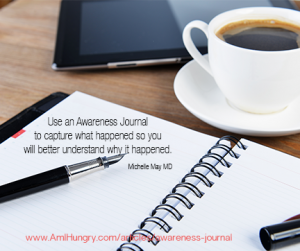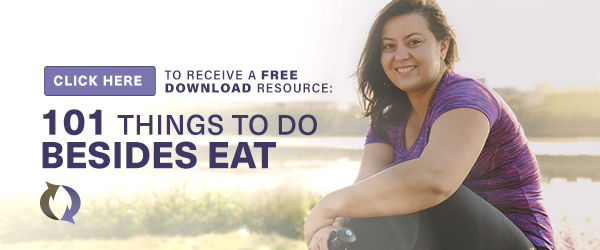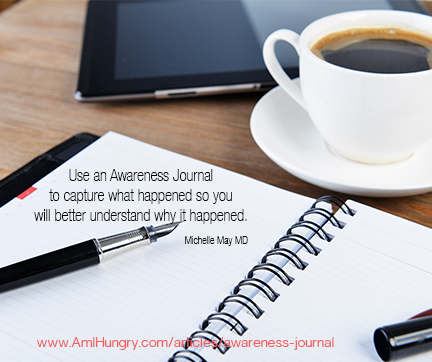Awareness is essential when you’re trying to form a new way of making more effective eating decisions. An awareness journal can help you identify and change eating patterns that aren’t working for you.
Have you ever logged food or kept a diet diary ?
I sure have! I felt really motivated at first, so I’d invest a lot of time and energy. I’d track every bite of food – weighing, measuring, looking things up, writing things down, and making mental calculations – and minutes of exercise.
Eventually, my motivation gave way to frustration, boredom, and occasional “creative” record keeping.
Awareness, Not Accountability
We encourage the use of an Awareness Journal in all of our Am I Hungry? mindful eating programs. So, what’s the difference between an Awareness Journal and food tracking that many of have tried in the past?
The intention.
 We call it an Awareness Journal because the purpose is just that—awareness. It’s like having a fly on the wall observing everything that’s happening. As you capture what happened, you will better understand why it happened.
We call it an Awareness Journal because the purpose is just that—awareness. It’s like having a fly on the wall observing everything that’s happening. As you capture what happened, you will better understand why it happened.
After all, you can only change what you’re aware of!
So how is using an Awareness Journal different? Maybe it would be easier to start by clarifying what it is not.
An Awareness Journal is not for:
- accountability
- counting
- making sure you’re “being good”
- judgment
“I’ve tried that before.”
Journaling about what you eat is nothing new because there’s a natural tendency to change behavior as you become conscious of it. But this is a different way to approach journaling. Lasting change comes from understanding why you make the choices you do and making connections between your thoughts, feelings, actions, and results.
The Am I Hungry? Mindful Eating Cycle provides a simple but effective format for organizing your observations and thoughts. It will help you notice why you are eating, when you feel like eating, what you feel like eating, how you eat, how much you eat, and where you spend your energy.
Even if you don’t make an immediate connection, journaling helps you remember what happened so you can reflect back on it and see if any patterns emerge. Journaling is also an important way to reinforce and practice key mindful eating concepts and to record gradual progress throughout your journey that might otherwise go unnoticed.
Five Secrets to Using an Awareness Journal Effectively
An Awareness Journal isn’t like logging your food to make sure you stay within the rules of a diet! Here are five specific things to think about to help you increase your awareness without triggering restrictive thinking.
1. Skip the judgment.
A fly on the wall doesn’t judge! By writing down your observations without judging them, you’ll be free to increase awareness, make connections, learn from your mistakes, and make it possible to choose differently in the future if it will serve you better.
2. The “why” is more important than the “what.”
You’re not using an Awareness Journal to track calories, points, carbs, or calories burned during exercise, so there is no need to weigh, measure, or count. In the long run, those methods feed into obsession, distraction, and restrictive eating. Instead, capture your food decisions using only as much detail as you need to help you see patterns.
3. Cultivate curiosity.
Food and exercise logs turn eating into a math problem. An Awareness Journal guides you to become curious about the factors that affect your decisions. Jot down hunger and fullness levels, other physical feelings (such as thirst, fatigue), thoughts, emotions, insights, self-care activities, and any questions you have. (If you are a Mindful Eating Support Community member, please post your observations and questions on our private Facebook page.)
4. Make note of your body’s feedback.
Your body provides you with constant feedback about the decisions you make. Here are some examples of helpful connections you might make from your Awareness Journal:
- “I ate a large bowl of pasta at lunch and I was sleepy during my afternoon staff meeting.”
- “I felt more energetic on the days I got up early to walk.”
- “I felt sad and craved macaroni and cheese all day.”
- “I am mad. I ate potato chips. I am still mad. And full. Next time I’ll try talking to Eric instead.”
When you jot down your eating decisions without judgment, you will have the information you need to investigate patterns and understand how you react to certain situations. As your awareness of your unconscious habits increases, you will be able to better anticipate your triggers and develop more effective responses.
5. Take a flexible approach.
Some people hesitate to start journaling because they’re waiting until the perfect time (which never comes). Or, they stop journaling simply because they missed a couple of days.
Forget the all or nothing approach to journaling! Perfection is not possible—or necessary. Any time you write something down, you increase the information available to you for learning.
Try it! Pretend there’s a fly on the wall simply observing what is going on during your next eating cycle. Using our Awareness Journal format, what triggers, cycle drivers, and patterns do you recognize?
See if the fly on the wall perspective helps you get the big picture and explore and improve your relationship with food and your body.
Enjoyed this article? Here are three more you might find helpful:
How to deconstruct overeating.
The power of the pause: mind-body-heart scan.
Mind-full eating is not mindful eating!
This article has been updated from a previously published version.


